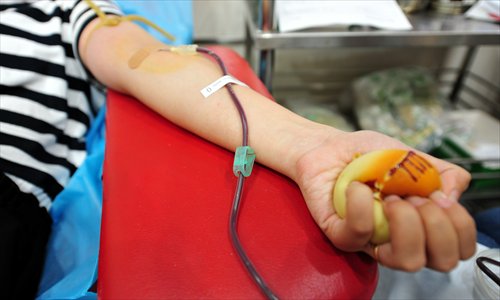COVID-19 patients should not donate blood for 6 months after they recover: Chinese health authority
By GT staff reporters Source: Global Times Published: 2020/11/18 23:35:21

File Photo: IC
China's National Health Commission has issued new guidelines on blood donation recently, saying people who have contracted COVID-19 should not donate their blood for six months after they recover.
Donors whose temperature is above 37.3℃, will be advised to be tested for the virus, the guideline says.
The ban aims to prevent the spread of the coronavirus through blood transfusion, an immunologist who asked not to be named told the Global Times on Wednesday.
While clinical trials suggest the anti-bodies in the blood of people who have recovered from COVID-19 may be effective in treating people sickened by the virus, there are concerns about the safety of the general blood supply, Wang Peiyu, deputy head of Peking University's School of Public Health, told the Global Times on Wednesday.
It normally takes three to six months for patients to be fully recovered from the disease, Wang noted. However, there might still be a few remaining viruses in their blood, which is why blood donations from people still in the recovery phase should be dealt with great caution.
The latest protocol requires medics to clearly understand the health condition, travel history and likely contact with infected persons before accepting a donor's blood.
Blood donors with a recent history of living abroad or in high-risk areas are also banned, as are donors who had taken influenza or novel coronavirus vaccine.
The guideline aims to prevent the spread of the coronavirus during the winter, to protect staff and donors at donation sites and ensure the supply of blood.
Donors who learn they have contracted the coronavirus after giving blood need to timely report to the blood collection station so that it can make detailed records for virus tracking.
Posted in: SOCIETY